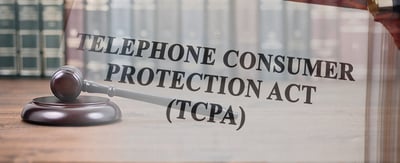
TCPA Compliance, Call Marketing, Text Marketing
Compliance for TCPA Text Messages, SMS, Autodialers & More
By Contact Center Compliance on Mar 4, 2024
Introduction to TCPA Marketing Regulations & Requirements
When you’re launching an outbound marketing campaign, there are many important questions you need to ask yourself. Are you targeting the right leads? Are you using the most effective channels? And most importantly—is it legal?
Most marketers don’t have to worry too much about running afoul of the law by engaging in their regular attempts to engage prospective customers, but for companies that engage in cold calling—specifically, companies that use autodialing systems or automated SMS messaging platforms—the first and most important part of their marketing plan is making sure they’re not violating the provisions of the Telephone Consumer Protection Act (TCPA).
The TCPA prohibits companies from calling numbers that have been placed on Federal, state, or company-specific do not call lists. The penalty for violating the TCPA can be anywhere from $500 per call for accidental violations to $1,500 for willful or knowing violations, and can be even higher if damages can be proven. Worst of all, there’s no cap on statutory damages, which sets the stage for multi-million dollar class action lawsuits for repeat offenders.
It only takes one disallowed call or text message to end up with TCPA lawsuit on your hands. An entire cottage industry has been built on TCPA litigation, which has resulted in class action lawsuits that have generated astronomically high judgments against TCPA violators. There were 4,392 TCPA lawsuits in 2017, an increase of 1,251 percent in just seven years.
This isn’t just a theoretical concern—huge, household-name companies like Wells Fargo and British Airways have paid out millions in TCPA lawsuit settlements in recent years.
Even if you don’t end up in the middle of a class action lawsuit, TCPA violations can be significantly detrimental to your business. Aside from the fact that dealing with them in any capacity will cost you time and money, taking you away from your core business operations, TCPA lawsuits can invite bad publicity and attention that hurts your brand and drives customers away.
Read on and we’ll help you understand what the TCPA legislation requires of you, how to stay in compliance with the law while running an outbound marketing campaign, and how to minimize your exposure to risk while maximizing opportunities to safely contact your best leads.
Texting, SMS Messaging, Robocalls & Manual Dialing Under TCPA
The TCPA was made into law in 1991 as a response to consumer concerns about unwanted calls from telemarketers and debt collection agencies. The law established a Federal do not call list and restricts the use of auto dialers, pre-recorded voice messages, and unsolicited faxes and text messages. The TCPA covers both landline and mobile phone calls. Compliance is enforced by the Federal Trade Commission (FTC) and the Federal Communications Commission (FCC).
The FCC created the rules that govern what kind of consent companies need to obtain from consumers in order to place robocalls to them, as well as the private right of action that allows consumers who have received unlawful calls to enter into individual or class action lawsuits.
Staying compliant with the TCPA can be challenging at times, especially when numbers change ownership and you have multiple do not call lists to scrub your call list against. The biggest risk of violating it is that you’ll call a litigious individual who seizes the opportunity to take you to court in the hopes of getting a big payout.
TCPA Litigation
All TCPA lawsuits are not created equal. There are three very different types of litigant who might go after you following a TCPA violation. The first type are the individual plaintiffs—many of whom may be opportunists or serial litigators—who stay alert for possible TCPA violations made against them and threaten to sue as soon as it happens. Generally, they’re looking for companies to settle (in other words, pay them to go away) rather than fight a court battle. Often, they will specifically target small businesses that don’t have lawyers on staff. These litigators will always approach the business before filing suit to try to negotiate a settlement.
Next are the professional litigators who skip the settlement attempt and actually file lawsuits right off the bat. They tend to target larger businesses than the first group. Their goal is to win a formal award of compensatory fines in court, and dealing with them can be very time-consuming and costly, win or lose.
The last type are the law firms that initiate class action lawsuits. These suits go after damages for every individual person who might have been impacted by the defendant’s TCPA violations, which can add up to hundreds of millions of dollars. Each person named in the lawsuit may only get a small fraction of the total payout, but the lawyers stand to make a hefty profit on a successful case. Large corporations are usually the targets; one of the biggest settlements to come out of a class action TCPA suit happened in 2014 when Capital One paid $75.5 million after they were sued for using auto dialers to call their customers’ mobile phones.
TCPA Consent for Calls & Text Messages
To engage in automated calling or texting, you need to obtain the proper consent under the TCPA. Generally, automated calls or texts that contain marketing require express written consent whereas different types of calls such as informational calls, public utility notifications, or package delivery notifications only require express consent. Regardless of the consent you have, you must always honor opt-out requests.
Express Consent – A written or verbal agreement in which the consumer clearly states their consent to receive calls at a particular number. When a consumer knowingly provides a phone number to a company in the course of regular business dealings, express consent for non-marketing calls is implied, so long as the purpose of the call is consistent with the customer’s original reason for providing the number.
Express Written Consent – Defined by the FCC as a written agreement between the business and the consumer that clearly provides authorization for the business to place calls to the consumer for the purpose of delivering “advertisements or telemarketing messages using an automatic telephone dialing system or an artificial prerecorded voice.” The text of the agreement should include the specific phone number in question and disclose that consent is not a condition of purchase, and the consumer must sign the agreement with a physical or electronic signature.
Prior Express Written Consent must be obtained before:
-
Calling any landline or mobile number with a prerecorded marketing message (this includes texting)
-
Making marketing calls to any landline or mobile number on the DNC registry
-
Using an auto dialer to call or text a mobile phone number
Wireless and VoIP Numbers
Back when the TCPA was being written, mobile phones were still quite new and most users had to pay costly pay-per-minute charges for all of their outgoing and incoming calls. While the vast majority of mobile phone users are on unlimited calling plans now, marketers are still subject to the TCPA’s original, more restrictive provisions around calling cellular phone numbers.
To place autodialed calls to a mobile phone for marketing purposes, you need express written consent. For non-marketing calls, express consent is sufficient. Mobile phones used to be identifiable by their unique three-digit prefixes, but this is no longer the case. Phone numbers are frequently transferred between carriers and the prefix is no longer a reliable indicator of whether a number belongs to a mobile phone or a landline.
VoIP phones, increasingly common as replacement for landlines in many households, are treated the same as mobile numbers under the TCPA, despite the fact that it is very rare for these numbers to incur pay-by-minute charges. Nevertheless, marketers must make every attempt to identify these numbers and scrub them from their call lists.
Reassigned Numbers
One key fact of the TCPA is that consent is linked to individual persons, not their phone numbers. Consent to call a particular number immediately becomes invalid if that number gets transferred to a new owner.
In the past, marketers were allowed one mistaken call to a reassigned number, but a DC Circuit Court ruling has removed that protection and lawsuits can now be filed over a single erroneous call to a reassigned number. Identifying reassigned numbers can be difficult, but it is essential for marketers to make every attempt to do so.
How to Minimize TCPA Risk & Maximize Opportunities
For telephone marketers, the TCPA has essentially set up an obstacle course with the highest stakes imaginable. You have to avoid all the hazards, neutralize risk by obtaining the proper form of consent, and identify the hidden traps in your database, like professional plaintiffs and reassigned numbers. Meanwhile, you also have to maintain, update, and scrub against Federal, state, and internal DNC lists.
It’s a lot to take on if you still expect to execute a successful outbound marketing strategy, but while you should approach the hazards of the TCPA with extreme caution, don’t let it stop you from reaching out to your leads and customers.
The following tips can help you stay safe:
-
Take advantage of exceptions within the TCPA, like calling consumers with whom you have an Established Business Relationship (EBR)
-
Identify known litigators who may already be in your CRM by their names, phone numbers, and other contact information—and make sure these names don’t ever migrate to your call list
-
Make an ongoing action plan for identifying wireless, VoIP, and reassigned numbers in your database
-
Make sure you have a clearly explained, well-documented process for obtaining consent from your customers
-
Include a legally-vetted arbitration clause in your consent agreements stating that if any dispute arises about the services provided under your terms and conditions, the customer will go into arbitration and cannot enter into a class action lawsuit
The last tip is the most important one! These clauses really do stop lawsuits that might otherwise cost companies millions of dollars.
Conclusion/The Right Experts with the Right System
Afraid of the professional TCPA litigators lurking in your customer database? Unsure of your capacity to maintain and update the massive do no call databases you’re required to have? Daunted by the prospect of remembering all of the exemptions and exceptions involved in scrubbing your lists accurately? That’s totally understandable—staying compliant with these laws is neither easy nor optional. Fortunately, there are expert solutions that can help you.
The right specialists, flexibly working with and around your existing internal processes, can take on both the big-picture tactics and granular details involved in staying compliant, leaving you to focus on your business operations without worrying that devastating fines or lawsuits might pounce on you at any moment.
At Contact Center Compliance, we utilize an advanced do not call scrubbing tool called DNC Scrub® that includes Litigator Scrub®, an award-winning, cloud-based defense against serial TCPA litigators and professional plaintiffs. This solution encompasses all of the legislative compliance requirements we discussed above, helping our clients eliminate exposure to both TCPA and DNC risk.
Our DNC Scrub® solution includes the right ecosystem and IT resources to fully manage your Federal, State, and Internal DNC scrubs and all TCPA provision requirements in a single job. We offer simple, flexible processes that allow our customers to come to our website and manually upload a list of phone numbers, schedule nightly SFTP jobs, or set up real-time API connectivity. Additionally, you can get real-time updates and increased efficiency from our enterprise-level integrations with platforms you’re already using, such as Salesforce, Five9, Genesys, ActiveProspect, VICIDial and Mitel.
With over 70 billion scrubs (and counting) performed and 0 violations, fines, or lawsuits incurred by our clients, you can now market with confidence.
We’re happy to talk more about how we can help you minimize exposure to DNC and TCPA compliance threats. Click here to book time with a friendly compliance expert.



